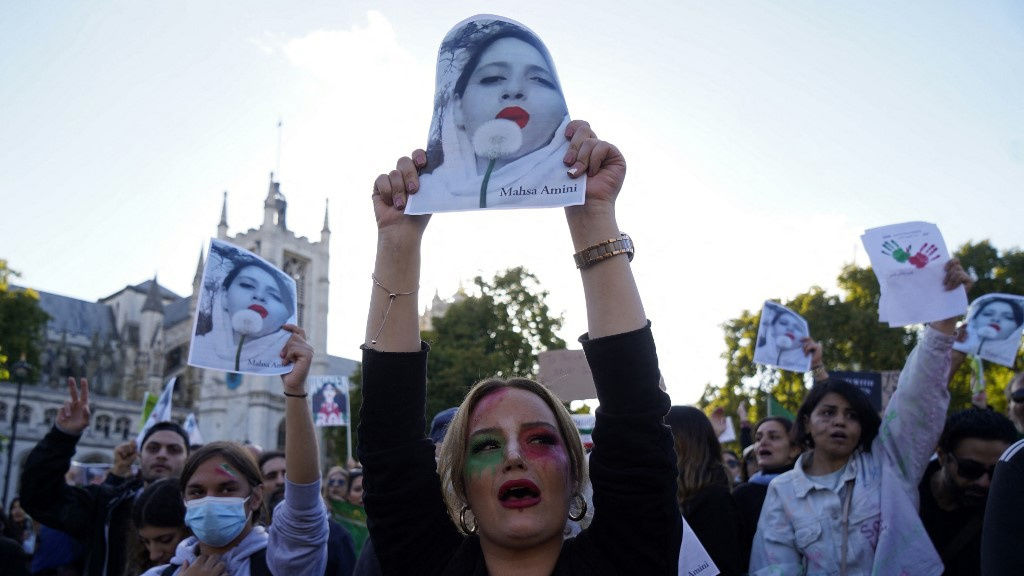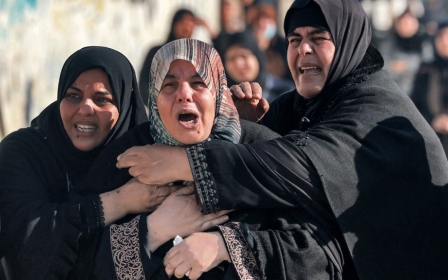Western feminism's silence on Gaza lays bare its moral bankruptcy

From the outset of the war on Gaza, an unsettling narrative has permeated western media, portraying Israel as a paragon of civilisation starkly contrasted against the bastion of backwardness that is the Middle East. Some pundits have even gone as far as reducing its people to the level of the animal kingdom.
Such bias is nothing new, further amplified in the UK by outlets such as UnHerd, as media propaganda continues the unsettling tradition of misrepresenting the Arab community. But it has been unexpectedly troubling to hear such distortions echoed by British feminists and activists.
If you are following well-known UK feminists in hopes of finding a united outcry and empathy for the violence faced by Palestinian women and children, I am afraid you will be deeply disappointed.
Despite the International Court of Justice’s warning that Israel’s onslaught in Gaza could plausibly be a genocide, some of western feminism’s most vocal champions against gendered violence seem to have reserved their solidarity for Israeli women alone, accusing the international community of remaining silent about the rapes and sexual assaults against Israeli women on 7 October.
Don’t get me wrong: as feminists, our creed to believe women and condemn the weaponisation of rape in conflict is non-negotiable, even in complex situations where direct victim testimonies are scarce and evidence comes from entities such as the Israeli army.
Stay informed with MEE's newsletters
Sign up to get the latest alerts, insights and analysis, starting with Turkey Unpacked
Yet, the absence of comparable empathy and fury for the plight of Palestinian women and children reveals a shocking double standard and deep moral failure.
This is not the first time western feminists have fallen short. This brand of feminism, with its history of shining a spotlight only on issues palatable to western tastes, often ignores the concerns of brown women.
Selective ire
This disturbing pattern is unmistakably evident in what’s widely referred to as “imperial feminism”. Consider the outcry from UK feminists over the tragic case of Iran’s Mahsa Amini, who was punished for her “improper” hijab, leading to her death.
Like many, I was incensed by the injustice she faced. The global reaction to Amini’s ordeal sparked a significant feminist movement, with solidarity in the UK, as activists staged dramatic hair-cutting protests in the heart of London.
Follow Middle East Eye's live coverage of the Israel-Palestine war
Yet, the dire situation facing Palestinian women and children in Gaza has not benefitted from similarly loud and passionate advocacy. It’s as though feminist ire and power selectively rears its head for issues that fit a decidedly western narrative of liberation - leaving others, such as those in Palestine, in the shadows.
The history of imperial feminism is like a broken record, replaying the same errors without learning lessons. Draped in the lofty notion of “liberation”, it often imposes western values on women around the globe, leaving chaos in its wake.
This brand of feminism overlooks the fact that women, no matter where they are, possess their own voices and resilience
Take the example of Iraq, where military intervention was partly framed as an attempt to liberate Iraqi women from tyranny. This rationale, using women’s rights as a shield for war, didn’t take into account what would come afterwards, or what Iraqi women truly wanted and needed.
Predictably, this led to turmoil, increased violence, and the breakdown of the very social fabric that held communities together, making life even harder - especially for women.
This same western narrative to “liberate” Afghan women from the Taliban’s harsh grip initially created some new opportunities for them in education and employment. But years of upheaval and instability followed, leaving Afghan women in a precarious position today.
Once again, this brand of feminism overlooks the fact that women, no matter where they are, possess their own voices and resilience. Imperial feminism subtly perpetuates the notion that western methods are superior, while sidelining the rich tapestry of views that Iraqi and Afghan women hold, and the grassroots feminists fighting for change at home.
Grim cycle
In Palestine, the grim cycle of history is repeating itself. Western imperialism and colonialism is spinning its familiar narrative, claiming that Palestinian women need “rescuing” from Hamas, which is classified as a terrorist group in the UK and other countries.
This is similar to the narratives adopted in Afghanistan and Iraq, centred on liberating “brown women from brown men”. Meanwhile, the actual, ongoing plight of Palestinian women is little more than a side note.
This glaring oversight begs the question: why is it that only Israeli women receive expressions of concern or sympathy from some western feminists? Is it because they’re seen as more akin to western feminist ideals, and thus deemed more “worthy”?
When western feminism, amplified by the media, embraces the portrayal of Israel as just an underdog hitting back at terrorism, and any criticism of Israeli actions is swiftly branded as antisemitism, the ordeal of Palestinian women caught in the conflict is grievously ignored. UN reports have given detailed accounts of Palestinian women suffering sexual violence and torture in Israeli custody. Why aren’t we seeing floods of articles championing their cause?
There are also young children being detained and denied their rights. Doesn’t that stir something in you, push you to shout about it? It’s noteworthy how quickly numerous pieces in solidarity with Israeli women were published, but a mere mention of the violence affecting Palestinian women seems too much to ask for.
And so, instead of the worn-out question asking everyone to denounce Hamas, I’m turning the tables: can you clearly condemn Israel’s actions and the ongoing oppression of Palestinians?
Transcending divisions
The silence from those who should be the most vocal against the violence inflicted upon the women and children of Gaza, coupled with their fixation on Hamas, contradicts the very principles feminism purports to uphold. Their empathy conspicuously bypasses the unimaginable hardships facing Palestinian women: hunger, a lack of clean water, and a dire shortage of basic necessities. Some are eating grass for sustenance.
Astonishingly, there appeared to be far more uproar on social media about feminism and patriarchy over a Barbie star missing out on an Oscar nomination, than there has been over the dire conditions of Palestinian women giving birth without hospital care or basic hygiene; the lack of anaesthesia for vital C-sections; and the heart-wrenching deaths of newborns, due to the absence of neonatal care during power outages.
This deafening silence lays bare the moral bankruptcy of western feminism, which too often overlooks Palestinian women as deserving of the same empathy extended to others - effectively dehumanising them in the process.
Feminism, now ensnared in tribal warfare, seems to prioritise tribal allegiances over unity in the cause of humanity. This is a profound disappointment, and one that spans the entire political spectrum.
It’s high time we transcend these divisions and truly come together in the name of universal justice and empathy, remembering that at the core of feminism is the unyielding belief in the dignity and worth of every woman, regardless of where she lives or the politics that engulf her.
If feminist groups and the media continue to skew the narrative as they have been, we risk edging closer to government interventions reminiscent of France, where the gender equality minister has threatened to cut funding for feminist groups that diverge from Israel’s 7 October narrative.
This could set a dangerous precedent. Should such measures gain global traction, it could spell the end of inclusive, unbiased feminism - effectively bidding farewell to a movement that stands for all women.
The views expressed in this article belong to the author and do not necessarily reflect the editorial policy of Middle East Eye.
This article is available in French on Middle East Eye French edition.
Middle East Eye delivers independent and unrivalled coverage and analysis of the Middle East, North Africa and beyond. To learn more about republishing this content and the associated fees, please fill out this form. More about MEE can be found here.






.jpg.webp?itok=f2maUw-p)
